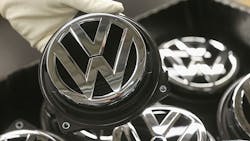VW Takes Global Sales Crown From Toyota Amid Diesel Crisis
Volkswagen AG dethroned Toyota Motor Corp. (IW 1000/6) last year to become the world’s best-selling automaker for the first time, propelled by surging demand in China, which has been largely unaffected by the diesel-cheating scandal.
Volkswagen (IW 1000/8) sold a record 10.3 million vehicles in 2016, outpacing its rival with a 3.8% gain from a year earlier. Toyota’s global sales, including its Hino Motors Ltd. and Daihatsu Motor Co. units, rose 0.2% to 10.2 million vehicles in 2016, the Japanese automaker said on Monday.
Taking the global sales crown marks the bittersweet culmination of an aggressive expansion that former Chief Executive Officer Martin Winterkorn kick-started 10 years ago. While surging demand in China and the popularity of the upscale Audi and Porsche brands’ lineups boosted worldwide deliveries, the VW marque lost market share in Europe, its second-biggest region, following revelations in 2015 that the company manipulated diesel engines to pass emissions tests.
No VW Diesel Scandal in China
VW group deliveries last year rose 12.2% in China, where the scandal is a non-issue because the automaker sells almost no diesel vehicles there. Sales in Europe gained 4%, less than the overall sector, while the crisis fallout hurt demand in the U.S. and recessions cut sales in Russia and South America.
The increase in sales tax on small-engine vehicles is set to weigh on deliveries this year in China, Volkswagen’s biggest national market, while in Germany, its home country, the namesake VW brand has started scaling back its large leasing fleet for employees, slowing growth. The marque accounted for almost 6 million of global group deliveries last year, and it’s targeting more than 3 million car sales in China this year.
Toyota’s sales last year lagged behind Volkswagen mainly due to its performance in the U.S. and China, with demand for its flagship Camry sedan waning in the U.S. and sales in China expanding at a slower pace than the overall market. Looking ahead, Toyota must contend with possible trade tensions as U.S. President Donald Trump pressures foreign automakers to make more cars and trucks in the U.S.
“The development of the U.S. market is set to decide if VW can stay ahead of Toyota this year,” Sascha Gommel, a Frankfurt-based analyst at Commerzbank AG, said by phone. “If the Chinese and European markets continue to be solid and the U.S. market weakens as I expect, VW might stay first in 2017 as Toyota has a larger exposure to North America.”
Since his inauguration, Trump has withdrawn the U.S. from the Trans-Pacific Partnership trade accord, reaffirmed a campaign promise to renegotiate the North American Free Trade Agreement involving Mexico and met with automakers to persuade them to keep production within the U.S.
Toyota will invest $10 billion in the U.S. over the next five years, maintaining its pace of spending during the last half decade, joining other manufacturers with highlighting projects in response to pressure from Trump to create jobs in America. After criticizing Toyota’s plans to build a Corolla plant in Mexico, Trump rebuked Japan last week for sending the U.S. hundreds of thousands of cars from what he said were “the biggest ships I’ve ever seen.”
Small U.S. Exposure for VW
“Trump is a bigger risk for Toyota than for Volkswagen because the German carmaker has a small exposure to the U.S. market,” said Ken Miyao, an analyst at Tokyo-based market researcher Carnorama. “Toyota has made investment to build a new plant in Mexico and will have limited options to appeal to Trump.”
As part of a far-reaching overhaul under new division chief Herbert Diess, the VW brand has embarked on a restructuring push outside China and will boost its lineup of sport utility vehicles, the industry’s fastest-growing segment, where it lags behind Toyota and General Motors. Growth in China in recent years had masked weak returns in Europe and an ill-fated product strategy in Brazil, a former VW stronghold. In a U.S. comeback push, it’s rolling out the Atlas mid-size SUV and smaller Tiguan crossover with a longer wheelbase.
The VW brand in Europe still largely depends on the Golf hatchback and Passat sedan and station wagon, models in market segments that are being squeezed as customers shift to SUVs. It has revamped the Golf to stabilize sales, and that vehicle’s decline has been partly offset by surging demand for the updated Tiguan SUV.
VW executives have become tight-lipped about sales-volume targets as the company’s focus shifts toward safeguarding profits and preparing for a future where vehicle ownership becomes less relevant as ride-hailing and car-sharing gain in popularity.
“Our new strategy through 2025 doesn’t include any sales targets anymore,” Dietmar Voggenreiter, sales chief at VW’s premium-car unit Audi said in an interview this month. “These times are over.”
By Christoph Rauwald and Ma Jie
About the Author
Bloomberg
Licensed content from Bloomberg, copyright 2016.
